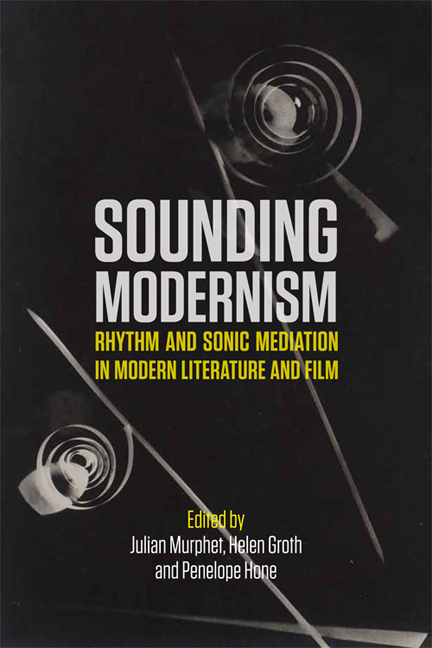Book contents
- Frontmatter
- Contents
- Acknowledgements
- 1 Introduction: Sounding Modernism 1890–1950
- Part One Writing Modern Sound
- Part Two Mediated Voices
- Part Three Difficult Voices
- 9 Harsh Sounds: George Gissing's Penetrating Literary Voice
- 10 Body and Soul: Modernism, Metaphysics, Rhyme
- 11 Listening to the Late Cantos
- Part Four Modern Rhythm: Writing, Sound, Cinema
- Notes on Contributors
- Bibliography
- Index
9 - Harsh Sounds: George Gissing's Penetrating Literary Voice
from Part Three - Difficult Voices
Published online by Cambridge University Press: 22 December 2017
- Frontmatter
- Contents
- Acknowledgements
- 1 Introduction: Sounding Modernism 1890–1950
- Part One Writing Modern Sound
- Part Two Mediated Voices
- Part Three Difficult Voices
- 9 Harsh Sounds: George Gissing's Penetrating Literary Voice
- 10 Body and Soul: Modernism, Metaphysics, Rhyme
- 11 Listening to the Late Cantos
- Part Four Modern Rhythm: Writing, Sound, Cinema
- Notes on Contributors
- Bibliography
- Index
Summary
In a 1912 review of George Gissing's career, Virginia Woolf draws attention to the late nineteenth-century novelist's treatment of the English lower classes. She notes how ‘many writers before and after Gissing have written with both knowledge and sympathy of the poor … There was Mrs Gaskell, for instance, and Dickens; a score of writers in our own day have studied the conditions of their lives.’ While Gissing joins this rich and long history, his novels stand out for their lack of sympathy for their subject and as such, as Woolf observes, have a discomforting effect on the reader. ‘The impressive part about Gissing’, Woolf writes, ‘is that knowing [the English lower classes] as he did he makes no secret of the fact that he hated them. That is the reason why his voice is so harsh, so penetrating, so little grateful to the ears.’ The harsh, penetrating effect of Gissing's literary voice is well recognised. Fredric Jameson proposes we read it as a ‘conduct of ressentiment’ against both the disenfranchised classes Gissing represents in his fiction and the middle-class bourgeois reading public for whom he writes. More recently, Aaron Matz has argued Gissing's acerbic tone be understood as a form of ‘vitriolic’ and ‘aggressive’ realism. Gissing's style can therefore be seen as a refusal to provide the nineteenth-century reader with an experience typically expected of the novel. Notably, in ‘The Place of Realism in Fiction’, Gissing resists the notion
that a novel is written ‘to please people’, that disagreeable facts must always be kept out of sight, that human nature must be systematically flattered, that the book must have a ‘plot’, that the story should end on a cheerful note, and all the rest of it.
Gissing advocates for an end to literary depictions of a world filled with pleasantries and shaped by happy endings. As he would have it, the novel should not show human nature in its ideal form, but instead expose its harsh and disagreeable qualities.
- Type
- Chapter
- Information
- Sounding ModernismRhythm and Sonic Mediation in Modern Literature and Film, pp. 133 - 148Publisher: Edinburgh University PressPrint publication year: 2017

